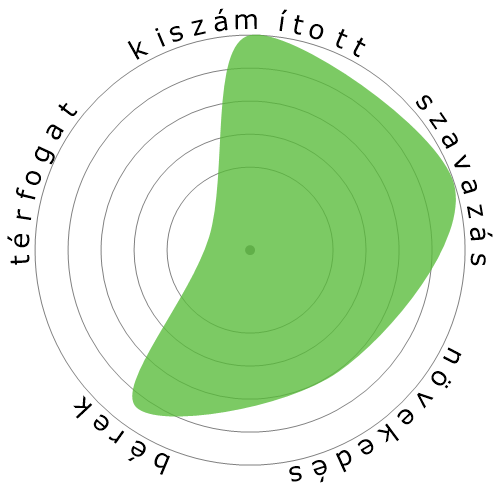Fizikusok
Hová szeretne legközelebb menni?
Vagy fedezze fel ezt a szakmát részletesebben...


Mit mutat ez a hópehely?
Mi ez?
Négy tényező alapján értékeljük a munkákat. Ezek a következők:
- Az automatizálás esélye
- A munkahelyek növekedése
- Bérek
- Rendelkezésre álló pozíciók száma
Ezeket az alapvető szempontokat érdemes szem előtt tartani munkakeresés során.
Az emberek ezt is megtekintették
Számított automatizálási kockázat
Minimális kockázat (0-20%): Ebben a kategóriában a foglalkozások automatizálásának alacsony a valószínűsége, mivel általában összetett problémamegoldást, kreativitást, erős interperszonális készségeket és magas manuális ügyességet igényelnek. Ezek a munkák gyakran bonyolult kézmozgásokat és precíz koordinációt igényelnek, ami megnehezíti a gépek számára a szükséges feladatok reprodukálását.
További információ arról, hogy mi ez a pontszám, és hogyan számítják ki, elérhető itt.
Felhasználói szavazás
A látogatóink szerint alacsony az esélye annak, hogy ezt a foglalkozást automatizálni fogják. Ezt az értékelést tovább erősíti a kiszámított automatizálási kockázati szint, amely 0,6% esélyt becsül az automatizálásra.
Mit gondol, milyen kockázatai vannak az automatizációnak?
Milyen valószínűséggel fogják Fizikusok robotok vagy mesterséges intelligencia helyettesíteni a következő 20 évben?
Érzelem
Az alábbi grafikon ott jelenik meg, ahol elegendő szavazat áll rendelkezésre ahhoz, hogy értelmes adatokat lehessen előállítani. Az idő múlásával mutatja a felhasználói szavazások eredményeit, egyértelműen jelezve a hangulati trendeket.
Érzelem az időben (évente)
Növekedés
A(z) 'Physicists' munkahelyi nyitások száma várhatóan 7,2%-kal nő 2033-ra.
Teljes foglalkoztatottság és becsült állásnyitások
A frissített előrejelzések 09-2025 időpontban esedékesek..
Bérek
A(z) 2023-ban a 'Physicists' éves középfizetése 155 680 $ volt, vagyis 75 $ óránként.
'Physicists' magasabb összeget kaptak, mint az országos mediánbér, ami 48 060 $-n állt.
Bérek az idők folyamán
Térfogat
2023 időpontjában 18 350 ember dolgozott 'Physicists' munkakörben az Egyesült Államokban.
Ez körülbelül a < 0,001% -át képviseli az országban foglalkoztatott munkaerőnek.
Másképp fogalmazva, körülbelül minden 8 ezer. ember 'Physicists'-ként dolgozik.
Munkaköri leírás
Végezzen kutatást a fizikai jelenségekkel kapcsolatban, fejlesszen elméleteket a megfigyelések és kísérletek alapján, és dolgozzon ki módszereket a fizikai törvények és elméletek alkalmazására.
SOC Code: 19-2012.00
Hozzászólások (45)
If any junior reads this message, I can only wish you the best. While your work is irreplaceable by AI, your future will be filled with problems where AI cannot assist you. Good luck.
If anything, I can see some simulation aspects or redundant experimental procedures being automated in the near term. But parts that incorporate creative problem solving or the physical intuition needed in determining directions to take research are things that are pretty safeguarded to humans for a bit.
I think those "intuitions" are very difficult to map to general problem-solving algorithms.
We can have a discussion on whether it is possible in the next 200 years, sure, but 20 years? That's laughable. Given that only physicists are qualified to write, train, and optimize the algorithms that would be used to replace them, it will take a long, long, long time.
I suspect that we would need true machine sentience before we could actually start to talk about replacing theoretical and mathematical physicists.
Válasz a hozzászólásra